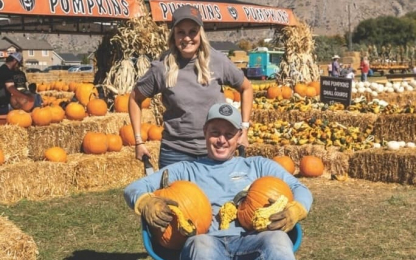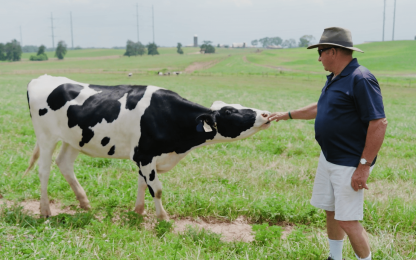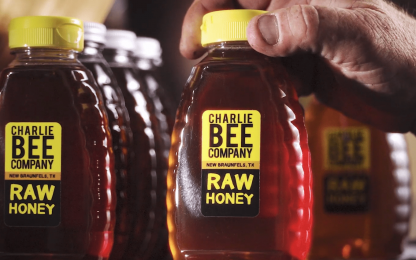Debbie Carr has grown chrysanthemums in her yard for as long as she can remember.
Although she has always loved the cheery blooms of this popular perennial, it wasn’t until 2008 that she began to turn that love into a business.
Humble beginnings
Debbie and Allen Carr got married in 1974, a week after Debbie graduated from high school. “I married a farmer, and that’s what we have spent our life doing,” she said. Three years after tying the knot, the couple bought their first farm and home, and soon after, they added two children to the mix: daughter April in 1977 and son Jason in 1979.
Starting out, the Carrs grew burley tobacco and commercial cattle, a farm scene that’s familiar to many Kentuckians. But as time went on, many farmers stopped raising the golden leaf, especially after the introduction of the Federal Tobacco Transition Payment Program. Also known as the tobacco buyout, it was designed to help tobacco farmers transition from federally controlled prices and limited production to a free market. “It became harder and harder to find help with the tobacco,” said Jason.
Trying something new
In response to the challenge, Debbie proposed that the family try growing fall mums to help replace some of the revenue once generated by tobacco. And, in 2008, the Carr family made a leap of faith and grew 500 mums.
“My husband said, ‘You’ll never sell that many,’ but I proved him wrong!” Debbie said. In 2018, the family raised its last tobacco crop and decided to go “all in” with the mum operation.
“Mums involve the grandkids more and it is something we can do as a family, without a lot of outside labor,” Debbie said. “And it all happened by accident. We had a hobby that turned into a business.”
A big success
In 2020, the Carrs had 12,000 mums for sale with 9,700 reserved for fundraisers conducted by more than 23 organizations. The Carrs sell the rest of their crop directly from their farm in Fayette County.
In addition to the mums, the operation consists of 75 commercial cows, as well as rolled hay for cattle and custom mowing work.
The timeline on a mum farm
In early June, the Carrs pick up the young mums in Lancaster, Pennsylvania, and haul them to the family farm in Lexington for potting.
“We try to have the pots ready and make sure everything is working before we leave,” said Debbie. “This year, we planted 12,000 mums in about 10 hours – the whole family was helping.” Each pot has its own metered water line that carefully provides just the right amount of water for each plant.
Fast forward to late August, when the mums are ready for sale. Customers purchase the plants by variety and color through September. Once it’s time to start delivering to fundraising locations, the Carrs load their cattle trailers with the amount of each color needed and are on the road seven days a week. Customers can also purchase mums directly from the farm.
Once the flowers are sold, Debbie spends mid-October through mid-April seeking new business and setting up fundraising orders for the next season.
A family affair
Carr Family Mums is truly a family enterprise, and the love the Carrs have for one another and the land they work is evident. Although the farm began with Debbie and Allen, it has grown every year and continues to expand to this day.
Everyone works together to enable the business to succeed. Debbie manages the day-to-day operations, tends the plants, keeps the books and organizes orders and deliveries. Jason helps fix big problems and is the farm’s irrigation expert. Jason’s wife, Tabitha, has an off-farm job in Cynthiana and helps with the operation. Debbie’s daughter, April, and her boyfriend, also named Jason, work off-farm and are involved with the family farm as well.
The grandkids get their hands dirty, too, as they help plant, weed and work with the mums. “We pay them, so they learn what work is, and we hope they’ll save some money for college,” said Debbie.
Educating youth about agriculture
The Carrs firmly believe that exposing young people to farming helps teach them responsibility while enabling them to understand the importance of the role of farmers play in the U.S. economy. For this reason, they regularly welcome youth from both the city and the country to help on the farm.
“We hope they get together and talk about memories they have,” Debbie said. “We want them to remember this as a fun place, not just the work, but the way of life.”
Looking back and looking ahead
“People ask me why I don’t retire, but what else am I going to do?” Debbie said. “I’ve always worked. My dad is 85 years old, and he still grows a garden and sells vegetables.”
She hopes the farming tradition will continue with future generations. “I hope the farm is something in a couple years that my kids will want to take over the day to day,” she said.
The farm was named “Tobacco Did-It Farm” years ago, Debbie laughed and said, “We need to add – and Mums are keeping it going.”
When asked what the Carr family would like to be remembered for, Debbie said, “We made a living, and we helped some kids along the way. That’s a good feeling.”
Central Kentucky Ag Credit is proud to partner with Carr Family Mums.


